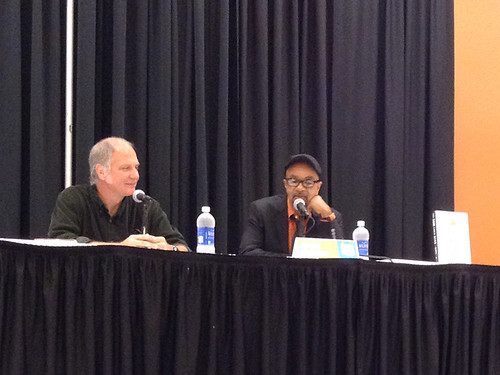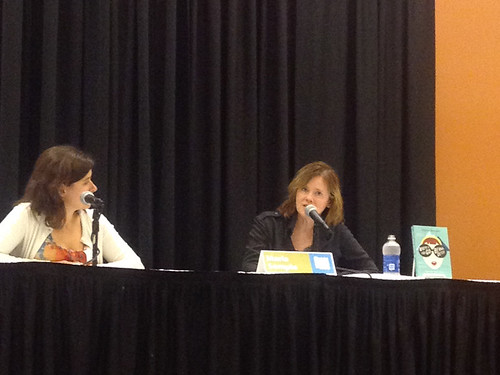Over the weekend I had the pleasure of attending Books by the Banks, an awesome celebration of authors and books and reading and writing, put on annually by the local libraries and my favorite independent bookstore (Joseph-Beth, where Andy proposed).
Previous years have brought some amazing authors like Garth Stein, Jennifer Weiner, and Dennis Lehane. This year was no exception.
James McBride
Author of THE COLOR OF WATER, a memoir about growing up biracial, which I read in college and loved and identified with, despite a few obvious differences. His latest is THE GOOD LORD BIRD, “a novel of caricature” (as he calls it) about abolitionist John Brown.
- “I just think it’s easier to get to people’s hearts when you make them laugh.”
- He found it compelling to write about this time period because people were making “real choices that could get you killed.”
- Regarding John Brown’s letter-writing in prison: “In those 6 weeks, he did more with his pen than he ever did with his broadsword or a gun.”
- “Every story has several different sides, and the responsible writer tries to present multi-faceted characters so the readers can see [those sides].”
- McBride says he’s not really an outliner but that he spends a lot of time on characters, because “characters create plot.”
- He rewrote the foreword and first chapter of THE GOOD LORD BIRD many, many times. “Because you’re competing for readers’ attention in bookstores. It’s you or… EAT, PRAY, LOVE.”
- Within the “first 2 or 3 chapters, you really have to engage the reader deeply.”
- “Slavery in America enslaved us all.”
- “We are all slaves to something.” (Social media and our cell phones were examples he gave, if I recall correctly.)
- Regarding gentrification, not just of physical areas but also of society: “All these bumps and bruises of American life are being flattened out.” He indicated that he did not think it was necessarily better or worse, but that there was some color/flavor being lost to the smoothness.
Maria Semple
Former TV writer (for Arrested Development and Mad About You, among others) and now author of WHERE’D YOU GO, BERNADETTE, a comedic novel about an unhappy wife in Seattle. Confession: I only read this because my book club chose it, but I ended up loving Bernadette so much that I bought copies for each of the two friends who hosted me during my recent trip to Seattle.
- To my surprise, Semple revealed that BERNADETTE is in many ways autobiographical. She gave up her successful career in LA to move to Seattle, and became deeply unhappy there. Instead of looking inward, she blamed the city and the people. When a friend told her that she was becoming “a menace to society,” she thought that was a delightful idea and decided to write about it.
- “You’re not just a storyteller; you’re a story-withholder.” In other words, writers need to think about what they’re not revealing to the reader, as much as what they are.
- When asked about the relationship between her screenwriting and her novel-writing, and what writers of each discipline can learn from the other, Semple said that in both, “Scenes are the building blocks of story-telling.”
- Also: “I don’t think enough stuff happens” in fiction.
- Sometimes she actually asks her students, “Do you know what action is?” (Presumably because they are turning in stories where people just sit and talk about their feelings.)
- As a writer, “you want to be out living life, seeing things, and meeting people.” Otherwise you’ll have nothing to write about.


6 responses to “Wisdom from James McBride and Maria Semple”
Interesting how they approached similar questions with, on one hand, people making “real choices” that could mean life or death, and, on the other hand, whether stuff “happens” or not in fiction. These seem related to me — actions and consequences.
Oh, and gentrification. I think things are definitely getting flattened out. One effect of the Internet is that there are fewer and fewer subcultures anymore. When I was growing up, Black people were listening to some records that white people never heard of (Rudy Ray Moore, for example). This was true of “underground” gay culture as well. Nowadays, any slang you hear that you don’t understand, you just Google it. It was a lot more fun the old way.
And, yes, a story-withholder. Very well put. I’ve often said that writing fiction is the art of concealing (and occasionally revealing :-) ) information — the opposite of the newspaper dictum that who, what, where, why, and when have to be in the first paragraph. And to take it even further, there’s Hemingway’s “iceberg” theory: http://en.wikipedia.org/wiki/Iceberg_theory.
I love the part about scenes being the building blocks — such an important reminder that every scene really does matter. Each one has to play a specific role in creating the whole.
Sounds like a fun event! :)
Thanks for all the great writing tips! I want to read Where’d You Go, Bernadette and didn’t know that the author was a TV writer or that much of the book was based on her experiences. I want to read it all that much more now.
Anthony-
Oh, absolutely action & consequences are related. :)
I’d not heard of Hemingway’s iceberg theory, at least not as such. Thanks for introducing me to it!
Shari-
It totally is, and I think you’d love it. Leah Stewart moderated Maria Semple’s session this year, but she’s been featured on a panel herself in the past (along with Curtis Sittenfeld), and one year Jennifer Weiner and Beth Hoffman were here.
Meghan-
Somehow I think you’ll really enjoy BERNADETTE — perhaps because of the West Coast satire element. Also, to clarify, I would say BERNADETTE is emotionally autobiographical, but that the plot points/events are not based in reality.
Hi Kristan, thanks for visiting me on The Debutante Ball. Loved your Star Trek post. Now I’m tooling around your site–which I like a lot! Favorite bit from this post: “You’re not just a storyteller; you’re a story-withholder.” So true!
Thanks for visiting me back, Lisa! And for your kind words. :)